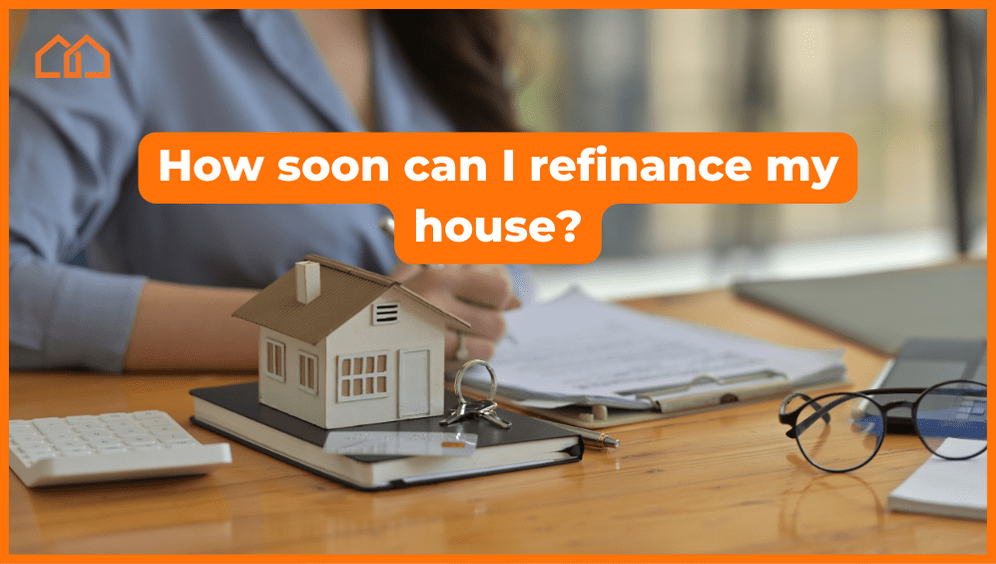How soon can I refinance my house?
If you buy real estate with a mortgage, then the prospect of refinancing may come to mind, especially when interest rates improve. Even when average interest rates hovers around 8%, there are still individuals who can benefit from refinancing.
For example, if you bought a house in the early 2000s when interest rates were similar, you can use a cash-out refinance to free home equity while getting a lower monthly payment (since there wouldn’t be much principal left on your home loan).
If you plan to do a mortgage refinance in the future, how soon do you have to wait? We will answer this question along with other helpful insights so that you can make the best decision.
So, when can I refinance my house?
The short answer is that you can refinance anytime you want. You can even refinance right after you get your loan and close on your house. You can refinance six months after buying, ten years later, or the day after you become a homeowner.
There are different rules for refinancing different types of loans, like Jumbo, FHA loan, USDA loan, conventional loan, etc. There are also some considerations and drawbacks to refinancing. Preferably, you should also wait for favorable conditions so that refinancing benefits you. Also, you need to make sure you meet certain conditions.
What do I need to refinance my mortgage loan?
To refinance loans for homes, you can get the best terms under these conditions:
- Have more than 20% of equity. This can happen instantaneously with a large down payment. You just need to make a large enough gap between your home value and what you have left to pay toward your loan. If you have less than 20%, you may have to accept higher interest rates from your mortgage lender.
- Have a decent credit score. Depending on what type of loan you have, the minimum score is different. For example, for a VA loan from the Department of Veterans Affairs, the minimum score is 580. To find out what your credit score is, get a free credit report from sites like Experian.
Beneficial Mortgage Refinancing Situations
When done right, refinancing can lower your monthly payments, free of margin for you to do the things you love, and even give you a cash out that helps you pay for significant expenses like college tuition or a wedding.
The most common scenario in which somebody refinances for a benefit include:
1. When you can get a lower interest rate.
This could happen if a borrower took out a no closing cost loan that has a higher interest rate, or if somebody bought a house when interest rates were higher than current rates. For example, if you bought a house in the late 2000s at an 8% interest rate and decided to refinance when rates were rock bottom in 2020, monthly payments would most likely have improved.
2. When you plan to stay in your house for a long time.
If you refinance to lower your mortgage payment, expect to pay a few thousand in closing costs. This means that though you save money in regular payments, you won’t break even until you pay this loan for a few years. But if you plan to stay for many years, you will pay off the closing costs while reaping higher margins every month. If you don’t mind renewing your loan term, then refinancing can be right for you.
3. When the loan amount is significantly paid off.
This allows you to tap into equity to improve your home and make future Investments. Since your loan is paid down so much, refinancing it with a cash out refi can enable you to make some strong financial moves with a lump sum of money.
4. When you want to switch to a fixed-rate mortgage.
Maybe you started with an ARM because you didn’t know if you wanted to stay in your home, but now you’re certain this is where you want to plant roots. Refinancing to a fixed-rate mortgage will make all your payments the same as opposed to an ARM that can be unpredictable.
5. When you want to get rid of private mortgage insurance.
One way to get rid of PMI is to refinance. Pay down your mortgage to your loan’s required amount (for example, conventional mortgages require 20% paid off) and refinance to get rid of the extra monthly fee. You can also avoid PMI altogether when you make a high down payment in the first place.
6. When your credit score improves.
If you got your original loan with not-so-great credit, an improvement in your score can get you a better interest rate. It never hurts to see what deals you can get by talking to a lender. No matter what type of mortgage you get, better credit often means better rates.
7. When you can cash out to buy a new home.
If you have enough equity to unlock toward a large down payment or to buy another property in full, then a cash out refinance can give you the money you need without borrowing from anyone else. You can use this cash out to pay for all or most of a new property upfront, which will grow your real estate portfolio.
When Refinancing Isn’t Beneficial
There are situations in which refinancing isn’t the best solution. Refinancing involves closing costs and fees that will be added to your loan. Look before you leap to make sure that refinancing doesn’t hurt you. Here are some instances in which a refi won’t help you.
1. You’re not getting a better deal.
If you just buy a home and you want to refinance, you must consider that the interest rates are essentially the same. You can even end up with higher monthly payments. If you haven’t paid your house down a lot, the equity that you cash out on will not be worth the closing costs and new loan origination fees that come with it too.
2. When you include closing costs in the refinance.
This raises your interest rate, which can raise your future monthly mortgage payment compared to your current mortgage. Though it seems tempting to go this route, you can save more by not increasing the amount you owe while adding to your interest payments. Only do this if the interest rate you do receive from this option is significantly lower than the original interest rate.
3. When you don’t want to start your loan over.
When homebuyers refinance a current loan, even a 30-year loan that was paid down for 7 years becomes a 30-year loan again. You can, however, negotiate a different loan term, like 25 years, but these aren’t guaranteed to come with lower interest rates. But if you can refinance from a 30-year mortgage to a 15-year mortgage, you can pay off your mortgage sooner in exchange for a higher payment.
Should you refinance right now?
As you can see, deciding to refinance is based on a variety of factors. Your financial situation and existing mortgage terms play a large role in whether it’s a good idea or not. Refinancing starts a new mortgage, which means you need to be fully committed to the new terms. If you have any questions about how else to get cash from your home equity, such as via our new construction programs, contact us today!
Alicia Persson is a Content Strategist SEO writer at Marketplace Homes, utilizing previous years of experience on real estate teams that specialized in investments and property management. Before she joined Marketplace Homes, she was also a freelance writer for 7 years, leading to a specialization in real estate and home living content for boutique digital marketing agencies. During her writing years, she learned the basics of SEO and gained experience writing for many different clients, making her versatile at creating diverse content.
She is a proud University of Virginia master’s graduate and enjoyed her undergraduate years at the University of Mary Washington. When Alicia is not writing, she plays keytar and sings in a local 90’s rock cover band, or she spends time with her amazing family.


